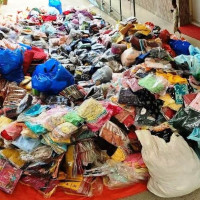- Saturday, 23 August 2025
What Is Next ?
We graduate. We pose for pictures. We write long captions with sentences thanking our teachers, friends, and maybe even ourselves. And then — silence. Now we’re stuck staring into the blank space after the classroom, asking the question that has haunted many young Nepalis after graduation: What now?
In Nepal, we grow up believing that education is everything. From an early age, we’re conditioned to study hard, get good grades, and earn degrees. What we aren't conditioned for is what to do with all of that. The system essentially guarantees, through the different phases of education — school, +2, bachelor’s, maybe a master’s — that we will eventually land someplace stable. A job. A future. A life.
But more often than not, we find ourselves stuck in the void.
Many new graduates are finding that their degrees do not provide employment. Job markets are flooded, hiring is driven by nepotism or personal connections, and almost all entry-level jobs require years of experience. Experience that, may I remind you, people have gained while spending the past four years in classrooms and not in an office. For anyone without access to money, privilege, or powerful family names, the path forward seems confusing and, in some cases, non-existent.
It is even worse that the education we have received does not, in any way, prepare us for life. We remember theories but we do not know how to budget, how to network, how to apply for jobs, and heaven forbid we actually learn how to file our taxes. Even soft skills, such as communication skills, leadership skills, or creativity — all of these skills are vital in nearly every profession — are sidelined in favour of memorisation and exam performance. Our creativity is stifled, our curiosity is punished, and our confidence is chipped away each day.
This is why we endlessly scroll through LinkedIn, repeatedly check job portals with no hope of getting into the field that we spent years studying for, or apply for random internships that do not pay us any money and have vague titles. Some of us remain at home and look for government jobs that we may never even get. Others apply for student visas for postgraduate study — not out of a love for the profession — but out of a desire to escape. When "home" feels dead-end, almost any uncertainty is better than feeling stuck.
This uncertainty, this fear of "what's next?", is a defining characteristic of Nepali youth.
And this is not only about jobs, it's about identity, direction, and purpose. We graduate from the education system, anticipating clarity. But we leave instead with stress and anxiety. We anticipate being met with exhilaration and enthusiasm for the journey ahead, but instead, we are met with failure — every system, model, structure that raised us gives us uncertainty, no map, no safety net, no second chances.
Mental health is affected. Young people are beginning to internalise assumptions that they are the problem – that they are not good enough, smart enough, or capable enough – but the reality is that there is a broken educational system, and young people are not lost; they are unsupported.
So what needs to change?
We need an education system that can meet the future, not one that is bogged down by the past. This involves the repositioning of education, overhauling our curriculum, but also practical learning and shared experiences in real work. Career counselling should occur in school; once students leave school, there is little to no guidance. Internships should be structured, paid, and accessible. And skills development should be valued as highly as any exam mark!
We also need a shift in culture. It’s time to stop associating success with government jobs or moving abroad. We need to support different pathways – vocational training, startups, freelancing, the arts, social enterprises - because not every young person dreams of a desk job and 9-to-5.
More than anything, we need to have conversations about this. Open conversations. Honest conversations. Let young people admit, “I don’t know what I’m doing,” without feeling bad about that. Wanting to know “what’s next” doesn’t make us weak; it just makes us human.
Currently, too many young people in Nepal find themselves on the edge of adulthood without a safety net. We are ambitious. We are capable. But we cannot create a better future for ourselves if we are always trying to figure out what comes next after the classroom and not getting answers.















